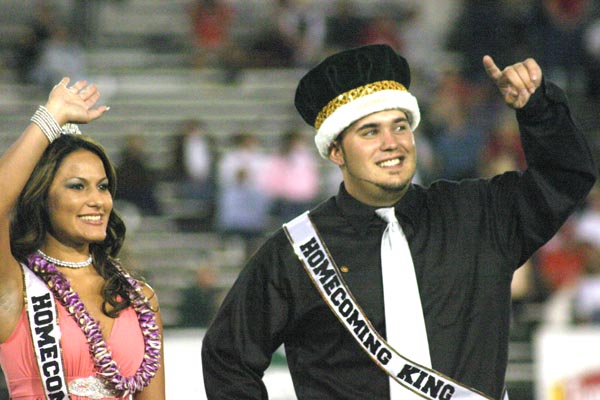ASI nominates new executive vice president

File photo: Homecoming queen Lindzie Navarrette, a senior criminal justice major, and Homecoming king Curtis Grima, a sophomore journalism major, wave to the crowd at halftime of the Sacramento State football game on Oct. 1, 2005.:
March 5, 2007
President Jesus Andrade nominated Curtis Grima, a senior government-journalism major, as Associated Students Inc. executive vice president on Wednesday at a working board meeting.
Though Grima will be new to the position of executive vice president if he is appointed, he is certainly not new to ASI. Within the last two years, he was secretary of State Affairs and served as a liaison between ASI and the California State Student Association.
After ASI board members reflected on both unfinished and new business, Andrade gave Grima the chance to speak on behalf of his nomination in office.
“I just want to thank all of you guys, Jesus and the board, for being here and giving me the opportunity,” Grima said. “I think ASI is a great vehicle to promote student interest, and I’m just glad that I can be a part of it.”
Grima said his goal was to go along with what ASI has already done in its strategic planning sessions and retreats. Grima said he is going to focus his energy in going in the same direction as ASI.
Andrade devoted a lot of his time in the quest for a new executive vice president by conducting a number of interviews.
“The candidates were a really tough choice,” Andrade said. “Everyone had EVP (executive vice president) qualities, executive qualities, leadership qualities.”
“I am just excited to be working with a motivated team of students that plays such a vital role in our campus community. I do not take this responsibility lightly and I will strive to go above and beyond the basic duties to fully serve the students,” Grima said.
Grima ran for ASI president in spring 2006. During the spring elections, Grima said he would focus on student issues such as striving to make Parking Structure III for students only.
He also platformed for:*ASI fiscal accountability: “No misuse of your money.”*No fee increases ever: “You already pay too much.”*Organizational Housing: “For athletes, organizations, clubs and Greeks!”
“Student parking permits were raised to $108 a semester to fund Parking Structure III,” Grima said. “No one else’s fees were increased to help fund this project. If students paid for it, it should be ours.”
At the next ASI Board of Directors meeting on Feb. 28, the board will determine whether Grima will be approved as the new executive vice president.
AFRICA funding withdrawn
ASI decided not to provide funding for Africans for Re-Education, Innovation, Consciousness, and Achievement after a long discussion that aroused strong emotions Wednesday. AFRICA is an organization made up of students, faculty, staff, and community members.
Its purpose has been to provide a forum of activities and events that will help develop the critical thinking and acting skills of the campus and community to engage in positive struggle for the forward advancement of African people, according to the association’s flier. It was stated that AFRICA applied for Dollars for Organizations and Clubs grant where it would receive $1,500 from ASI.
As a participant, ASI would receive a half page advertisement in the Conference Booklet, a listing as an Education/Government Level Conference Sponsor, and Education/Government Sponsor “Award of Recognition.”
Andrade told the AFRICA representative to go through with the DOC grant, and ASI will sponsor the organization in this manner.
Vice President of University Affairs Chris Ramos suggested that AFRICA go through other ways of getting money from ASI, as other clubs do, rather than receiving both $1,500 and $350 from ASI.
“If they (AFRICA) get the DOC grant, we’re giving them extra money; $1,500 and $350,” said Board Associate Rita Tyk.
Every student club on campus is eligible for $1,500 through DOC funding. Since AFRICA will be eligible, Andrade said it would not be fair to other clubs if ASI approved additional funding for AFRICA.
Sociology professor proposes legislation modifications
Sac State sociology professor Kevin Wehr said he felt uneasy about ASI’s legislation regarding the California Faculty Association and the California State University system at a working board meeting.
“Sacramento State asks the chancellor to act to avert a faculty strike by going back to a negotiating table, because this is in the best interest of students,” Wehr said.
Wehr has taught at Sac State for the last four years. He proposed ASI to change the language in the legislation, adding that the current language is “unhelpful.”
A strong believer in the strikes having a positive outcome on students in the long-term, Wehr stated that a happy faculty makes for happy students. Without bargaining in good faith for a fair contract, he added, morale is low and students will be affected.
To withhold his labor, in his opinion, is the only thing that the chancellor seems to listen to. Wehr does not want the students to suffer, but if push comes to shove, he claims he will be left with no other option but to withhold his labor.
Wehr went on to say that the legislation should address the unmet needs of the CSU and to reprioritize academics over executive salaries.
ASI board members did not make a decision as to whether they will modify the legislation or not.
Jacqueline Tualla can be reached at [email protected]











































































































































